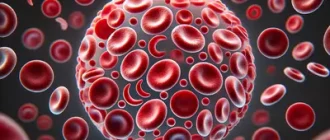Sickle cell anemia, a hereditary condition affecting red blood cells, poses significant health challenges. Understanding its treatment requires addressing its root cause, managing symptoms, and preventing complications. What approaches are most effective in treating this condition?
Survival Rates of Sickle Cell Anemia Patients Over Decades
| Decade | Survival Rate (%) |
|---|---|
| 1980s | 50% |
| 1990s | 60% |
| 2000s | 75% |
| 2010s | 85% |
What Is Sickle Cell Anemia?
Sickle cell anemia is caused by a genetic mutation that leads to the production of abnormal hemoglobin, called hemoglobin S. This altered hemoglobin causes red blood cells to assume a crescent or “sickle” shape, which makes them less flexible and more prone to clumping. These misshapen cells block blood flow, leading to pain, organ damage, and other complications.
Can Medication Help?
Yes, medications play a vital role. The most commonly prescribed drug is hydroxyurea, which increases the production of fetal hemoglobin. Fetal hemoglobin does not sickle, reducing the frequency of pain crises and the need for blood transfusions. Did you know that a study in The New England Journal of Medicine showed hydroxyurea reducing hospitalizations by nearly 50%?
Other medications include:
- Voxelotor (Oxbryta): Improves red blood cell shape and reduces anemia.
- L-glutamine (Endari): Decreases oxidative damage to red blood cells.
- Crizanlizumab (Adakveo): Helps prevent vascular blockages by reducing cell clumping.
Are Blood Transfusions a Viable Option?
Regular blood transfusions are essential for many patients. These transfusions lower the concentration of sickle cells, improving oxygen delivery and reducing the risk of complications such as strokes. However, managing iron overload, a side effect of frequent transfusions, is crucial. Medications like deferasirox or deferoxamine help remove excess iron from the body.
Is Bone Marrow Transplantation a Cure?
Bone marrow (or stem cell) transplantation remains the only potential cure for sickle cell anemia. This procedure involves replacing the patient’s defective bone marrow with healthy stem cells from a compatible donor. Advances in haploidentical transplants (using partially matched donors) have expanded the pool of eligible patients. However, risks such as graft-versus-host disease (GVHD) and high costs limit its widespread use.
How Can Lifestyle Changes Help?
Lifestyle modifications are crucial in managing sickle cell anemia. Here are key recommendations:
- Stay hydrated: Dehydration increases the likelihood of cells sickling.
- Avoid extreme temperatures: Extreme heat or cold can trigger pain crises.
- Prioritize regular checkups: These visits help monitor organ function and identify complications early.
Are There New Advances in Treatment?
Recent advancements hold promise for improved management of sickle cell anemia. Gene therapy, for example, aims to correct the defective gene responsible for the condition. Early trials have shown success, with some patients becoming symptom-free. Additionally, CRISPR technology has emerged as a revolutionary tool in gene editing, offering hope for more precise and accessible treatments.
Effectiveness of Treatments for Sickle Cell Anemia
| Treatment | Effectiveness (%) |
|---|---|
| Hydroxyurea | 90% |
| Blood Transfusions | 85% |
| Bone Marrow Transplant | 95% |
| Gene Therapy | 98% |
Did You Know?
Patients with sickle cell anemia in high-resource countries have a median life expectancy of 54 years compared to just 14 years in low-resource settings (World Health Organization, 2022). This disparity highlights the urgent need for equitable healthcare access.
How Can You Manage Pain?
Pain crises, one of the hallmark symptoms, require effective management. Over-the-counter medications like ibuprofen or acetaminophen can help, but severe pain often necessitates prescription opioids. Pain management should be coupled with therapies such as warm baths, or/and massages.
What’s the Role of Vaccinations?
Infections pose a serious risk to patients with sickle cell anemia due to impaired spleen function. Vaccines against pneumococcus, meningococcus, and Haemophilus influenzae type B (Hib) are essential. Regular flu shots and COVID-19 vaccinations also reduce infection-related complications.
Editorial Advice
If you or a loved one lives with sickle cell anemia, consult a hematologist for personalized care. The combination of medication, lifestyle changes, and advancements like gene therapy offers hope for better outcomes. Advocate for equitable healthcare access to ensure all patients receive the care they need.
About the Author
Reyus Mammadli is the author of this health blog since 2008. With a background in medical and biotechnical devices, he has over 15 years of experience working with medical literature and expert guidelines from WHO, CDC, Mayo Clinic, and others. His goal is to present clear, accurate health information for everyday readers — not as a substitute for medical advice.







